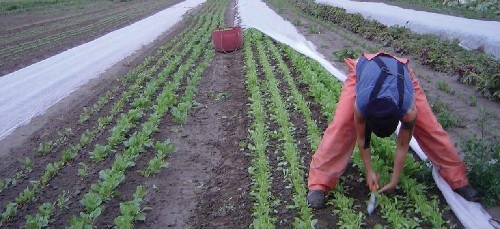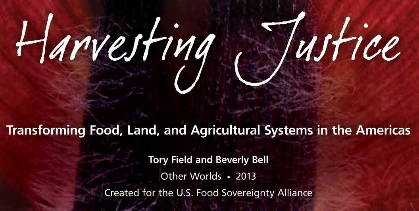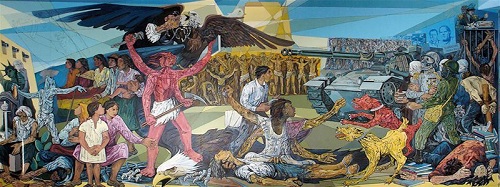
|
Mother Pelican
A Journal of Solidarity and Sustainability
Vol. 9, No. 10, October 2013
Luis T. Gutiérrez, Editor
|
|
|
|

|
|
|
"The Awakening That's Happening":
Local, Sustainable Food
Tory Field and Beverly Bell
This article was originally published in
Other Worlds are Possible, 17 July 2013
REPRINTED WITH PERMISSION

Harvesting greens at Next Barn Over Farm in Hadley, Massachusetts. CSA members visit the farm weekly from June to October to pick up their share of the harvest. Photo: Tory Field.
|
|
|
“People are realizing that we can’t rely on the industrial food system much longer. The awakening that’s happening is our greatest opportunity,” says New Mexican farmer and activist Miguel Santistevan. This awakening has sparked the revival of local, sustainable food systems.
At its most basic, sustainability connotes a system capable of continuing indefinitely without compromising future life. Sustainability is also sometimes described as a three-legged stool: in order to be balanced, it must sit equally on sturdy legs of economics, environment, and equity. A food system contributes to community sustainability if it is economically viable for small farmers; nourishing of the earth and elements; and socially equitable for all involved, including farm and food workers and consumers.
Examples in the movement to create local, sustainable food systems are virtually endless. Here are just a few:
Community gardens are sprouting up everywhere, with an estimated 18,000 in the US and Canada. In most cases, members rent a small plot for a modest fee. These patchwork-quilt gardens, primarily in urban areas, provide a local food source, build community relationships, beautify the neighborhood, and give more people the opportunity to eat homegrown food.
Educational gardening projects give children and teens the opportunity to get their hands dirty and learn about growing food. In East Oakland, California, youth with Oakland Food Connection grew over 3,000 pounds of produce in school-based gardens in one year. Now they’re branching out to create value-added products, like sauerkraut and jelly, and to run a catering business. On the other side of the country, in Orange, Massachusetts, Seeds of Solidarity works with rural and working-class youth to tend gardens at schools, a homeless shelter, and an elder care facility.
Deborah Habib, director of Seeds of Solidarity, said, “Every person is capable of helping to feed their community. To me, it’s really about reclaiming the heart-hands-land connection, so we can each participate, not only as consumers, but by cultivating the earth and cultivating foods.”
Farmers are growing food for public institutions like schools, universities, hospitals, and prisons. In one instance, the Berkeley Unified School District did away with its tater tots and canned peaches through a policy of increasing the amount of local, organic food it purchases. “We’ve gone from 95 percent processed foods to 95 percent made from scratch,” said chef Ann Cooper. To help allay the higher food costs associated with this program, the school system has gotten bulk discounts from farmers and processors, sources a significant amount of fresh produce from school-sponsored gardens, and uses federal reimbursements from the USDA as well as sales to students. There are now farm-to-school programs involving 12,429 schools in 50 states.
Real Food Challenge is working to shift $1 billion worth of college and university food purchases towards local, sustainable, and fair sources, and away from industrial agriculture. The nationwide project supports student organizers as they develop campus wide campaigns to get their schools to commit to purchasing 20% “real food” by 2020. They host leadership trainings and events, provide materials and other organizing support, and have developed a Real Food Calculator to help track institutional food purchasing. They define real food as “food which truly nourishes producers, consumers, communities and the earth. It is a food system – from seed to plate – that fundamentally respects human dignity and health, animal welfare, social justice and environmental sustainability.”
A sad joke goes: If your illness doesn’t kill you in the hospital, the food will. Fletcher Allen Health Care in Vermont and Cancer Treatment Centers of America in Illinois and Oklahoma are just a few of the hospitals around the country that are part of a growing network of farm-to-hospital programs. Four hundred and forty-four hospitals in the US have signed a pledge, organized by the group Health Care without Harm, to offer more fruits and vegetables, as well as locally grown, fair-trade, and pesticide- and hormone free food. Some hospitals also host on-site farmers’ markets, plant gardens, and compost food scraps.
Community Supported Agriculture (CSA) creates a direct partnership between a farm and members of the community. Members pay farmers at the beginning of the season, providing them with cash needed to purchase seeds and equipment. In return, each week they receive a share of the harvest, whatever is growing at the time. Members commit to sharing both the benefits and risks of each season. If there is a bumper crop of watermelon, everyone enjoys the abundance. If disease wipes out the tomatoes, share members ride that out as well. This commitment from members gives farmers more protection from both the whims of nature and price fluctuations of the market. By cutting out the middle-people, members have a more direct relationship with where their food comes from and receive a better price for local food.
Started in Japan, CSAs are catching on all over the US and the world. Since its introduction in the US in the l980s, the model has expanded to over 12,500 farms. In some rural areas, members pick up their share at the farm itself, while in cities, farmers drop off boxes of produce at distribution sites. The CSA model is now being used not only for vegetables but also for many other goods like grains, meat, dairy, fish, medicinal herbs, pies, and spun wool.
Farmers’ markets are also experiencing a meteoric rise. Between 1994 and 2011, farmers’ markets registered with the US Department of Agriculture increased 400 percent. They now number over 7,800. Markets are also vibrant community gathering spots, places to meet, play, connect, and unwind. Food from a farmers’ market or CSA typically travels between 10 and 100 miles, unlike the long distances traveled by their grocery store counterparts.
Farmers are continuing the time-honored practice of banding together through marketing cooperatives. Selling everything from cheese to cantaloupe, co-ops give small producers more bargaining power in the marketplace. They allow producers to pay discounted prices by buying in bulk; lower their transportation and distribution costs by sharing resources such as delivery trucks; earn a higher profit by eliminating some of the middlepeople; and access federal tax deductions. In 2008, the USDA reported that there were over 2,200 farmer, ranch, and fishery co-ops in the US, with a combined business volume of $213.4 billion. One small-scale example is Moo Milk in Maine. In 2010, 10 organic dairy farmers who had been dropped by the giant corporation Hood created the co-op, through which farmers now keep up to 90% of the profits.
Download the Harvesting Justice pdf here, and find action items, resources, and a popular education curriculum on the Harvesting Justice website. Harvesting Justice was created for the US Food Sovereignty Alliance, check out their work here.
Read more from Other Worlds here, and follow us on Facebook and Twitter!
ABOUT THE AUTHORS
Tory Field is Research and Education Coordinator, and Beverly Bell is Program Coordinator, for
Other Worlds. For more information about this program, as well as contact information, click here. For more information about the Harvesting for Justice project to transform food, land, and agricultural systems in the Amercas, click here.

|
|
A Contribution to the Climate Space 2013:
How to Overcome the Climate Crisis?
Pablo Solón
This article was originally published by
Focus on the Global South, 15 March 2013
REPRINTED WITH PERMISSION
|
Focus on the Global South was established in 1995 to challenge neoliberalism, militarism and corporate-driven globalisation while strengthening just and equitable alternatives. We work in solidarity with the Global South - the great majority of humanity that is marginalized and dispossessed by globalisation – believing that progressive social change and Global South solidarity are imperative if the needs and aspirations of oppressed peoples, particularly in Asia, Latin America and Africa, are to be met. For more information on this initiative, click here.
|
|
There is no single answer, no single campaign nor single approach.
To reduce greenhouse gas emissions to a level that avoids catastrophe, we need to:
- Leave more than two-thirds of the fossil fuel reserves under the soil;
- Stop the exploitation of tar sands, shale gas and coal;
- Support small, local, peasant and indigenous community farming while we dismantle big agribusiness that deforests and heats the planet;
- Promote local production and consumption of products, reducing the free trade of goods that send millions of tons of CO2 while they travel around the world;
- Stop extractive industries from further destroying nature and contaminating our atmosphere and our land;
- Increase significantly public transport to reduce the unsustainable “car way of life”;
- Reduce the emissions of warfare by promoting genuine peace and dismantling the military and war industry and infrastructure.
In other words we need to come out of the endless growth paradigm that is the basis of the capitalist system, and seek for a new kind of society that is grounded on care for each other and nature. A society that seeks happiness for all and not profit for a few. A society based on a different concept of prosperity and well-being. A bio-society for life that includes humans and nature.
To stop climate change we need to change ourselves. We need to stop thinking on growth and “development” and push instead for the redistribution of wealth. We need to end this insane competition between countries and promote real solidarity that takes into account the disparities created by the capitalist system. We need to recover our sense of community between us and with nature. We need to recover the control of the resources of the society that have been privatized to redistribute the benefits between all while preserving harmony with nature.
We need to come to the realization that the fight for climate justice does not only concern environmentalists and climate activists. It concerns all of us who live on this planet. For example, there is no way to have long standing employment and democratic systems if at the same time we don’t fight for a society that has a different relation with nature. A “democratic” regime that exploits nature as a thing will also treat and exploit people only as “capital,” “consumers” or “voters”. An economy that aims to grow beyond the limits of nature will sooner than later collapse and trigger unemployment.
We also need to end the hubris of man. We need to end the arrogance of man that he can control nature and solve the climate crisis with techno-fixes. Carbon markets, the monetary valuing of nature, “REDD” [1], “Green economy”, GMOs, agro-fuels, synthetic biology, nuclear projects, geo-engineering are all false solutions because they reinforce the misguided belief that humans can control nature through technology. It is also based on the false premise that the capitalist system and free market can solve the climate crisis that it has created by putting a price and commodifying the functions of nature. Instead of recognizing the limits of man and markets, they encourage suicidal technologies and promote new speculative derivative markets on nature.
We also need to re-evaluate our strategies in fighting for a global agreement. The negotiations at the United Nations will not address the deep causes of climate change if there is no social revolution in our countries, especially in the so-called industrialized countries. Social revolutions in the 21st century that don’t address in practice, with concrete results, the issue of the environmental crisis may end co-opted by the current capitalist system trying to seek a “development” and an “industrialization” that at this stage have to be completely redefined.
We cannot consume all our energy trying to lobby negotiators who at the end of the day receive the final instructions from governments that have already been captured by transnational corporations and elites that want to preserve their privileges in the business-as-usual regime. The real battle for climate change is in the streets, in the fields, in the forests. There will be change in national and global policies only when we have strong social movements that embrace the fight for social, economic, political and environmental justice across countries and across continents.
We are in a fight that we cannot lose. It is the fight for the survival of all humanity. In this long struggle for our future, we can and should fight for concrete goals that can invigorate our movement. Closing a coal mine, stopping a pipeline and a fracking project, banning GMOs, taxing carbon and over consumption, killing a free trade agreement [2], dismantling a military base, confronting corporate impunity, preserving indigenous territories, sinking carbon markets, stopping the privatization of water, ending land grabbing, occupying financial speculative markets and numerous other targets are all milestones in this crucial fight.
To address climate change we need to link all kinds of initiatives: legal reforms and civil disobedience, hunger strikes and national consultations, massive protests and creative individual actions, consumers’ actions and boycotts, occupation of banks and road blockages, political pressure and good example practices. We cannot lose energy in sectarian debates. The goal is to always try to go further from the original target, promoting broader and stronger forms of organization and mobilizations of workers, peasants, indigenous, women, youth, faith communities, migrants, intellectuals, artists, human right activists.
The biggest force of capitalism is inertia. To change the system we need to recover our ability to dream, we need to learn from our roots, recover experiences from indigenous people like the “Vivir Bien,” embrace alternatives like food sovereignty, defend our commons from privatization, promote the democratization of energy and most important of all, imagine a world where the rights of humans and Nature are respected.
[1] Reduction of Emissions from Deforestation and Degradation of forests
[2] Like we did with ALCA/FTAA and have to do with WTO
ABOUT THE AUTHOR
Pablo Solón is the Executive Director of Focus on the Global South based in Bangkok, Thailand. He was formerly Bolivia’s Ambassador to the United Nations and Bolivia’s chief negotiator on climate issues. He was also instrumental in organizing the People’s Climate Summit in Cochabamba, Bolivia (2010).

FOR MORE ON THE GLOBAL FOOD CRISIS
Human Carrying Capacity Is Determined by Food Availability, Russell Hopfenberg, Population and Environment, Vol. 25, No. 2, pp.109-117, November 2003
Avoiding Future Famines: Strengthening the Ecological Basis of Security through Sustainable Food Systems, UNEP Report, October 2012
Women's Work: Gender and the Global Food System, Tory Field and Beverly Bell, Other Worlds are Possible, 2 March 2013
Global Food Prices Continue to Rise
Sophie Wenzlau, Worldwatch Institute, 11 April 2013
Food sustainability and quality: challenging new opportunities bubble to the surface for food companies as the heat of debate is turned up, Andrea Cornelli, International Public Relations Association, June 2013
The Future of Food Insecurity, Jane Battersby, Foresight for Development, 23 September 2013
Hunger, Food Security, and the African Land Grab, Richard Schiffman, Ethics and International Affairs, Fall 2013
|
|Back to TITLE|
Page 1
Page 2
Page 3
Page 4
Page 5
Page 6
Page 7
Page 8
Page 9
Supplement 1
Supplement 2
Supplement 3
Supplement 4
Supplement 5
Supplement 6
PelicanWeb Home Page
|
|
|
|
"Whatever remains unconscious
emerges later as fate."
Carl Jung, 1875-1961
|
|
Page 5
|
|
FREE SUBSCRIPTION
|
![[groups_small]](groups_small.gif)
|
Subscribe to the
Mother Pelican Journal
via the Solidarity-Sustainability Group
Enter your email address:
|
|
|
|